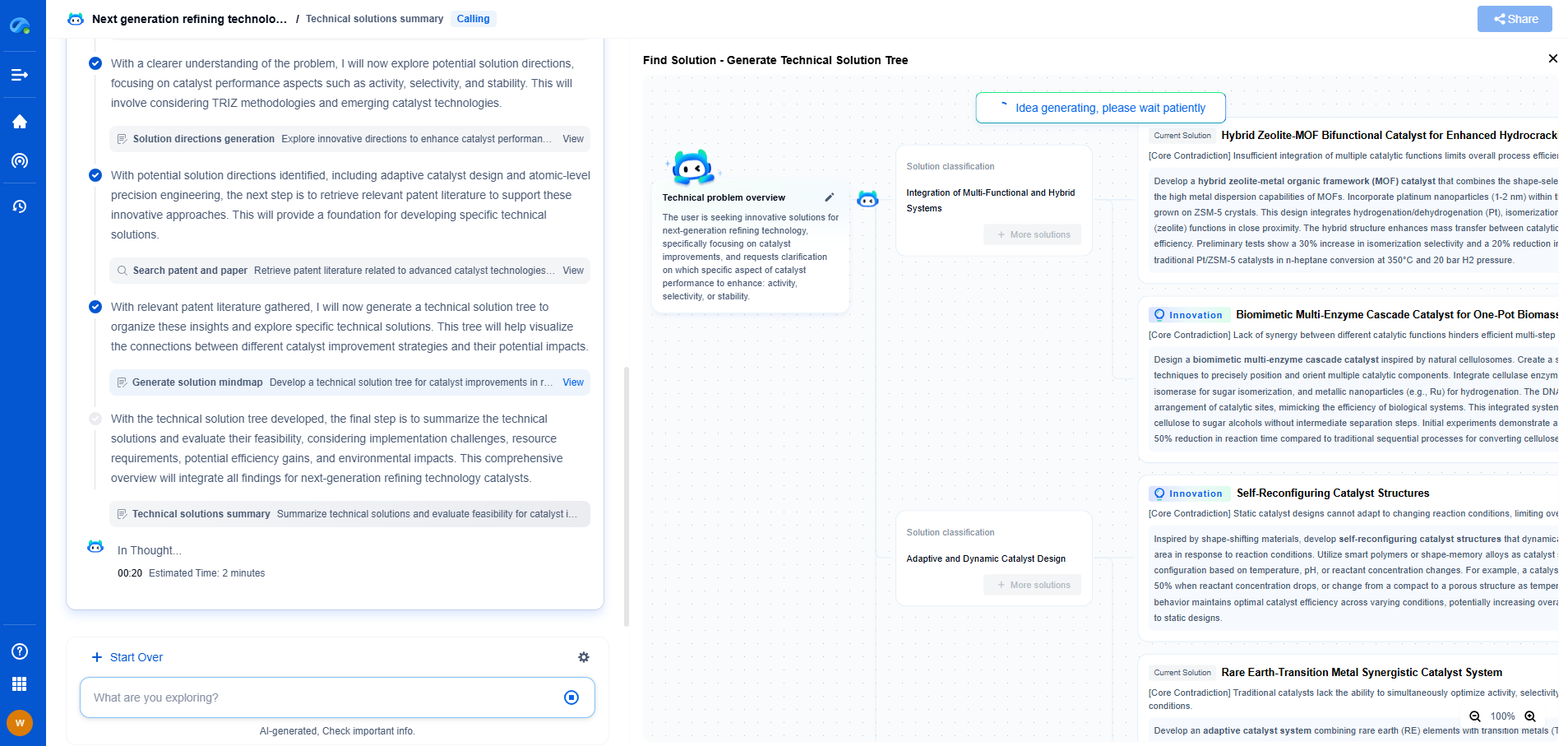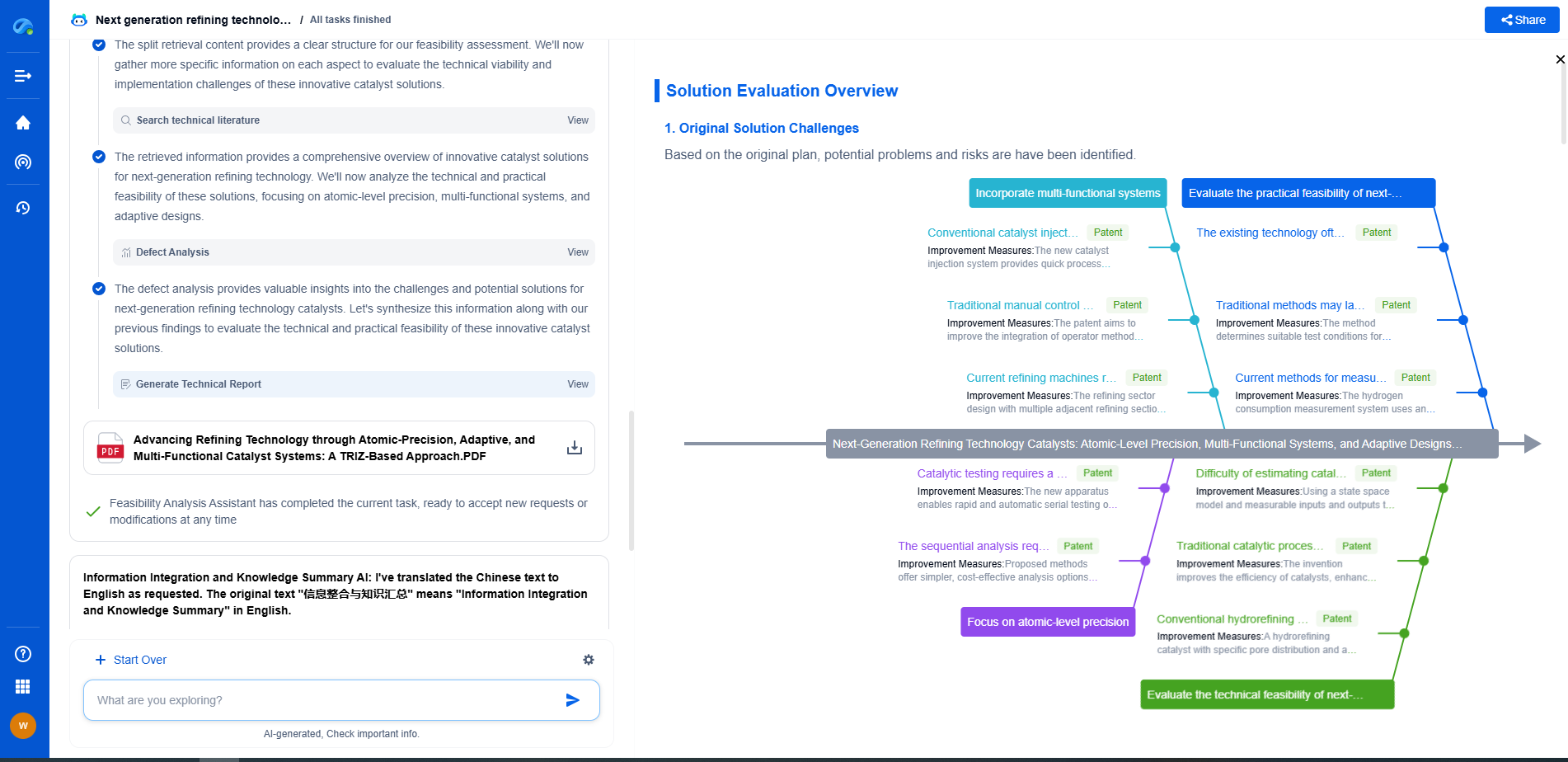Supercapacitor vs Lithium-Ion Battery for EV Charging Stations
JUN 26, 2025 |
As the world pivots toward greener energy alternatives, electric vehicles (EVs) have become increasingly prevalent. One of the critical components in ensuring the success of EV adoption is the efficiency and effectiveness of charging stations. At the heart of these charging systems lies the debate: Supercapacitors versus Lithium-Ion Batteries. Both technologies have unique benefits and limitations, making it essential to understand their roles in advancing EV charging infrastructure.
Understanding Supercapacitors
Supercapacitors, sometimes known as ultracapacitors, are energy storage devices known for their ability to charge and discharge rapidly. Unlike traditional batteries, supercapacitors store energy in an electric field rather than through a chemical reaction. This characteristic allows them to deliver bursts of energy quickly, making them ideal for applications requiring short-term energy boosts.
Advantages of Supercapacitors
1. Fast Charging and Discharging: Supercapacitors can charge and discharge in seconds, providing quick power delivery essential for high-demand situations.
2. Longevity: These devices have an extended lifecycle, often handling up to a million charge-discharge cycles without significant degradation.
3. Temperature Resilience: Supercapacitors operate effectively across a broader temperature range compared to many battery types.
Limitations of Supercapacitors
1. Lower Energy Density: Supercapacitors generally offer lower energy storage capacity when compared to lithium-ion batteries, making them less suitable for long-term energy supply.
2. Cost: They can be more expensive to produce, which might impede widespread adoption in cost-sensitive applications.
Lithium-Ion Batteries: The Current Standard
Lithium-ion batteries have become the standard in energy storage applications due to their high energy density and efficiency. They power everything from smartphones to electric vehicles, offering a balanced mix of performance and reliability.
Advantages of Lithium-Ion Batteries
1. High Energy Density: Lithium-ion batteries can store a substantial amount of energy, making them ideal for applications requiring sustained power.
2. Proven Technology: With years of development and widespread use, lithium-ion batteries are a proven technology with established manufacturing processes.
3. Versatility: These batteries can be used in a variety of applications, from small electronics to large-scale energy systems.
Limitations of Lithium-Ion Batteries
1. Slower Charging: Compared to supercapacitors, lithium-ion batteries take longer to charge, which can be a bottleneck in fast-paced environments.
2. Degradation: Over time, the capacity of lithium-ion batteries diminishes due to chemical degradation, reducing their lifespan.
3. Thermal Sensitivity: These batteries can be prone to overheating, especially during rapid charging and discharging cycles.
Supercapacitors and Lithium-Ion Batteries in EV Charging Stations
The ideal EV charging station might not rely solely on supercapacitors or lithium-ion batteries but rather a combination of both to leverage their respective strengths.
Hybrid Solutions: The Best of Both Worlds
1. Peak Shaving: Supercapacitors can be integrated with lithium-ion batteries to manage peak energy demands by providing short bursts of power, reducing strain on the battery.
2. Fast Charging: Incorporating supercapacitors can enhance the rapid charging capabilities of charging stations, minimizing wait times for EV users.
3. Energy Efficiency: A hybrid system can improve overall energy efficiency, reducing energy losses during charging and enhancing the longevity of the batteries.
Challenges in Implementing Hybrid Systems
1. Cost: The integration of both technologies can increase the upfront costs of charging stations, potentially impacting their economic feasibility.
2. Complexity: Managing two different storage systems requires sophisticated control systems to ensure seamless operation and optimal performance.
Conclusion
The debate between supercapacitors and lithium-ion batteries for EV charging stations is not about choosing one over the other but rather understanding how each can complement the other. While supercapacitors offer rapid charging and longevity, lithium-ion batteries provide the necessary energy density for sustained use. By exploring hybrid energy storage solutions, we can create EV charging stations that are not only efficient and effective but also pave the way for a sustainable future in electric mobility. As technology continues to evolve, so too will the strategies for optimizing energy storage and delivery in the pursuit of a greener planet.
Stay Ahead in Power Systems Innovation
From intelligent microgrids and energy storage integration to dynamic load balancing and DC-DC converter optimization, the power supply systems domain is rapidly evolving to meet the demands of electrification, decarbonization, and energy resilience.
In such a high-stakes environment, how can your R&D and patent strategy keep up?
Patsnap Eureka, our intelligent AI assistant built for R&D professionals in high-tech sectors, empowers you with real-time expert-level analysis, technology roadmap exploration, and strategic mapping of core patents—all within a seamless, user-friendly interface.
👉 Experience how Patsnap Eureka can supercharge your workflow in power systems R&D and IP analysis. Request a live demo or start your trial today.
- R&D
- Intellectual Property
- Life Sciences
- Materials
- Tech Scout
- Unparalleled Data Quality
- Higher Quality Content
- 60% Fewer Hallucinations
Browse by: Latest US Patents, China's latest patents, Technical Efficacy Thesaurus, Application Domain, Technology Topic, Popular Technical Reports.
© 2025 PatSnap. All rights reserved.Legal|Privacy policy|Modern Slavery Act Transparency Statement|Sitemap|About US| Contact US: help@patsnap.com

